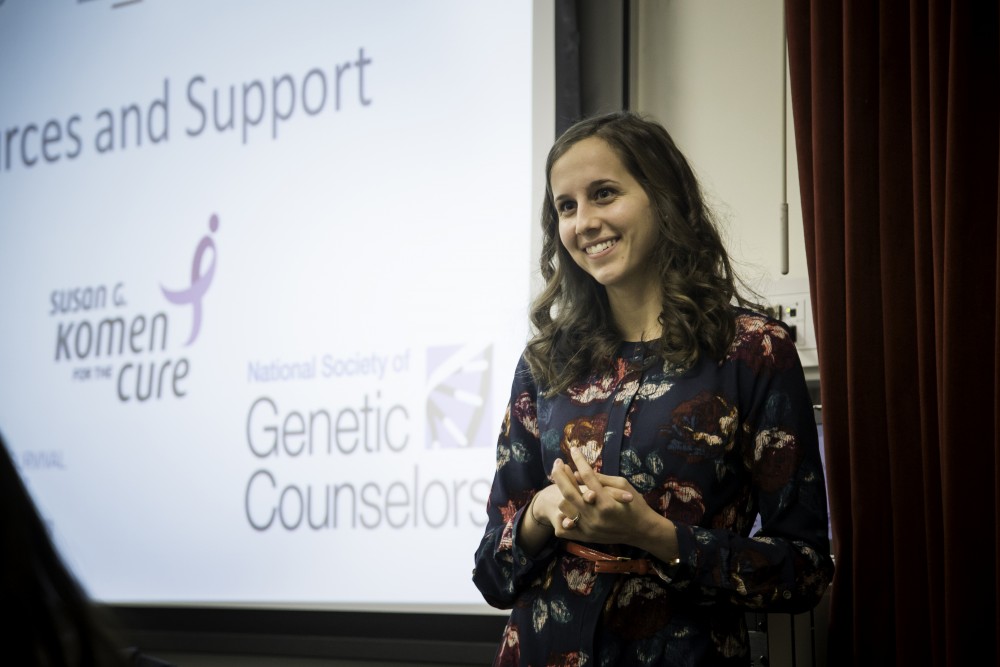Seminar raises awareness of hereditary cancers

GVL/Spencer Miller Cory Bourdon
Feb 23, 2015
Grand Valley State University’s student organization BRCAn’t Stop Me held a genetic counselor seminar in the Kirkhof Center on Thursday. The group’s goal is to raise awareness about hereditary cancer.
Mollie Smith, BRCAn’t Stop Me president, brought genetic counselors Corrie Bourdon and Mary Schultz, who serve as genetic counselors at Spectrum Health in Grand Rapids, to speak at the university.
“Basically, cancer is just uncontrolled cell growth or uncontrolled cell division,” Bourdon said. “A really important concept that is really tough for a lot of people to grasp is that all cancer is genetic, but not all cancer is inherited.”
Bourdon said about 70 percent of cancer is sporadic, or not inherited. In 2012, the University of Texas MD Anderson Cancer Center estimated that percentage to be even higher – around 75 to 80 percent.
“Only five to ten percent of all cancers are actually inherited, where you’re born with the mutation, increasing your risk for cancer; so it’s pretty rare to actually have this going on,” Schultz said.
Though hereditary cancer is rare, those who do have it can find themselves at a much greater risk for breast cancer, Schultz said.
Most inherited breast cancer cases involve two abnormal genes: BRCA1 (breast cancer gene one) and BRCA2 (breast cancer gene two).
“The BRCA gene mutation gives you up to a 87 percent chance of developing breast cancer in your lifetime if you’re a female,” Smith said.
The genetic counselors promoted increased surveillance as a way to manage or reduce the risks, starting with breast self-exams.
“This is really something that every female should be doing starting at 18 anyway,” Schultz said.
If one has a mutation in one of the breast cancer genes, Schultz recommended getting a clinical exam every six months – but not until the age cancer is expected, anywhere from age 20 to 25.
The mammogram is definitely an option, but so is an MRI, Schultz said.
“We try to do MRIs before to reduce the risks of radiation – just to reduce how much radiation over your lifetime you’re getting on your breasts,” Schultz said.
Genetic counseling can provide a lot of information, not just pertaining to the physical, and the two prefer a holistic approach.
“Even though we do a lot of education about what is genetics, what are genes, etc., it’s the whole, big, psychological part of it too that we discuss with patients,” Bourdon said. “Sometimes, I don’t even open my visual aid binder of all these pretty pictures I showed you guys, and we just purely talk about how this is affecting the family, how does this feel, what are we doing – and it’s more of an actual counseling session than a genetic education. It’s a great mix of both.”
Bourdon said Angelina Jolie helped increase awareness of genetic counseling across the country.
“I hadn’t heard about (genetic counseling) until I was a junior in college, not a single word of it,” Bourdon said. “I think, now, a lot of people know a lot more, thanks to Angelina Jolie.”
Jolie was on the cover of Time Magazine in May 2013 when she revealed she had a double mastectomy to prevent her risk of cancer. Jolie was a BRCA-1 gene carrier, and her mother died of ovarian cancer.
“All of a sudden, everyone saw it on the news. They read Time, and now they were worried that they have this genetic predisposition,” Bourdon recalled.
The impact was felt across the country, including the Midwest.
“Our doors flooded with referrals of worried people – some rightfully and some not,” Bourdon said. “I think since then we, across the country in genetics, have seen a dramatic increase in referrals and of people aware of the BRCA genes, of hereditary cancer and then what you can do about it.”
Genetic counselors must have a master’s degree and pass a board exam. Currently, the University of Michigan and Wayne State University are the only institutions in the state that offer such a program, but that might change.
“Grand Valley is supposedly starting one soon, and there are about 30 or so others in the country and they each accept 6 to 12 students per year,” Schultz said.
On Feb. 13, GVSU board members approved a new master’s program in medical dosimetry, but no official word has come on a genetic counseling program.
But the need is great, Bourdon said.
“Right now, I think the stats are there about 4,000 genetic counselors and the projected need is like 12,000,” Bourdon said.
Smith started the organization in 2014 as a support group for students who have the gene mutation.
“There are a lot of emotional stressors that come along with having this gene mutation, like the increased risk of having cancer (and) whether you pass it on to a family member,” Smith said.
The organization has been therapeutic for Smith and has been a platform to spread awareness.
“I believe that knowledge is power, and the more young adults we can inform about this gene mutation, the better, because the more lives we can save,” she said.





















